Brazil’s state-owned oil concern Petrobras said this Thursday that it will appeal the decision by Rodrigo Agostinho, the president of Brazil’s environmental regulator Ibama, to deny the company a license to explore for oil in the FZA-M-59 block, located one hundred miles off the coast of Amapá state in the Foz do Amazonas sedimentary basin. In a statement released fifteen hours after Agostinho announced his decision, which was based on an Ibama technical report concluded in April and published exclusively by SUMAÚMA, the company also said that it remains firm in its intention to explore for oil in Brazil’s equatorial margin, an environmentally sensitive coastline that stretches from Rio Grande do Norte (RN) to Amapá (AP). The company’s stance came as no surprise. More surprising was the reaction of Senator Randolfe Rodrigues, the government’s leader in Congress, who opened friendly fire.
Brazil’s equatorial margin is home to 80% of the country’s mangroves, various endangered species, and a little-studied coral reef system considered vital to fishing. In addition, since there is scant information on the dynamics of strong local marine currents, it is hard to predict what might happen in the event of an oil spill or what could be done to contain its impact. “The Foz do Amazonas basin is considered a region of extreme socio-environmental sensitivity because it contains Conservation Units, Indigenous Territories, mangroves, and biogenic formations of organisms such as corals and sponges and presents tremendous marine biodiversity, including such endangered species as the Guiana dolphin, Amazon river dolphin, sperm whale, fin whale, West Indian manatee, Amazonian manatee, and yellow-spotted river turtle,” Agostinho stated in the document.
It was in this context that Senator Randolfe Rodrigues, who hopes to run for governor in his home state of Amapá in 2026, resolved to leave his position clear to voters. To protest the decision, he made a noisy departure from the Sustainability Network, the party to which Environment Minister Marina Silva also belongs. Randolfe and Marina have been at odds for some months now, and the senator had earlier signaled his intention to leave the party. Randolfe had hoped to be assigned a ministry under Lula, but the party’s spot went to Marina, frustrating his expectations. The senator also had a falling out with the minister during selection of their party’s national committee. Randolfe backed Heloísa Helena while Marina supported another slate, with the Indigenous leader Joenia Wapichana, current president of FUNAI, Brazil’s agency for Indigenous affairs. Marina was defeated.
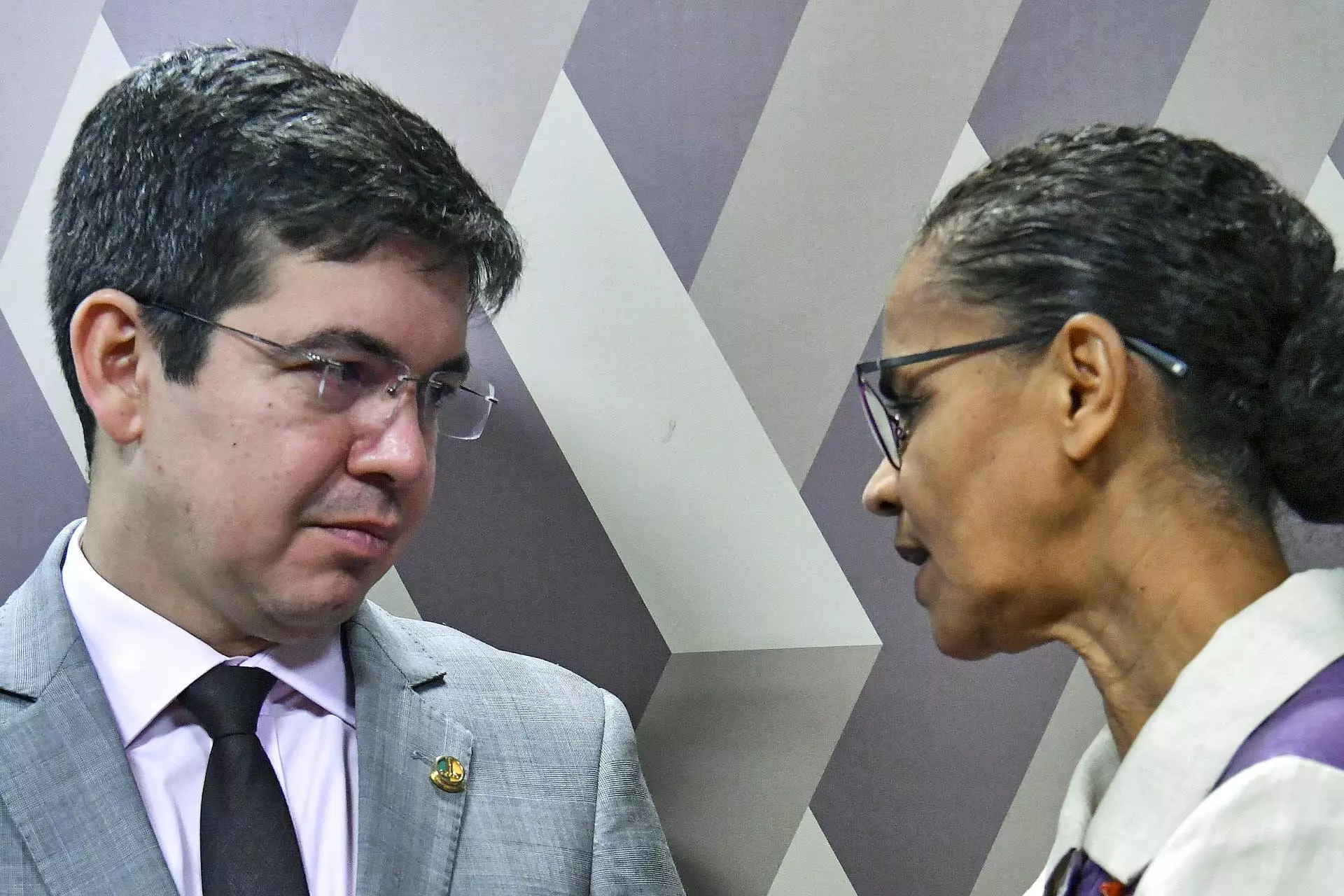
The clash between Randolfe Rodrigues and Marina Silva intensified in April when they contested leadership of their party, Sustainability Network. Nurturing political hopes of running for governor of Amapá in the future, the senator decided to show voters that he defends “job and income generation” by endorsing oil exploration. Photo: Geraldo Magela/Agência Senado.
The Amapá senator spent Thursday in Brasilia giving interviews, especially to media outlets from his home state. He even said that Ibama made its decision “in the dead of the night,” taking advantage of Lula’s absence from Brazil. In his statement, Randolfe deliberately ignored the federal agency’s technical work. Government sources heard by SUMAÚMA affirmed that, for the time being, Randolfe’s position as leader of the government is not under threat. But those close to Marina Silva considered the tone of the senator’s words—meant to send the message to Amapá voters that he supports “job and income generation”—both disturbing and inconsistent with the environmental commitments Lula made on the campaign trail.
“It was an unfortunate, regrettable decision that disrespects all the people of Amapá,” Randolfe said. The senator complained that no Amapá authority was consulted, nor were the citizens of his state.
Randolfe vies for political space with Senator Davi Alcolumbre (Brazil Union), who offered a “historical” defense of the agenda to drill for oil on the coast. Back when he was president of the Senate, Alcolumbre met with Petrobras to address the topic. “Ibama’s decision to deny Petrobras a license to conduct exploratory drilling in the equatorial margin of Amapá is an act of disrespect toward the people of Amapá. We will fight united, supported by technical, legal, reasonable, and proportional criteria, along with the federal government, federal and state legislatures, the state government, and civil organizations and society, to overturn this erroneous and unfair decision. Amapá will fight, and we will not fight alone,” Alcolumbre said in a statement posted on his social networks.
Randolfe, up until now recognized as a politician concerned with the environment, was widely criticized and also ridiculed on social media for rewriting his biography. One critic was Ricardo Salles, the environment minister under Jair Bolsonaro who is famous for having declared it was time to “let the cattle through” on environmental legislation, since the press was distracted by coverage of the COVID-19 pandemic. Salles tweeted: “Welcome to the team!” Along with: “Hey, wasn’t it Randolfe, ‘the environmentalist,’ who was always criticizing the Bolsonaro administration for its ‘anti-environmental’ projects and licenses? Now he got ticked off because IBAMA/Marina blocked the project to drill for OIL in his state, put his foot down, and left the party … Love wins!”
Petrobras reacts
Petrobras stated it will request “reconsideration at the administrative level,” to use technical jargon. In this case, the appeal will be analyzed by the president of Ibama himself, Rodrigo Agostinho, who in the document released Wednesday, May 17, said the state-run oil concern’s proposal to drill in the FZA-M-59 block “presents inconsistencies that are of concern for safe operations in a new drilling frontier of high socio-environmental vulnerability.” Another option for Petrobras would be to re-apply for a license—although the recently closed application process dragged on for nine years. The company has applied for licenses in another five blocks in the Foz do Amazonas basin, acquired from TotalEnergies after the French company’s original application was denied by Ibama, in 2018.
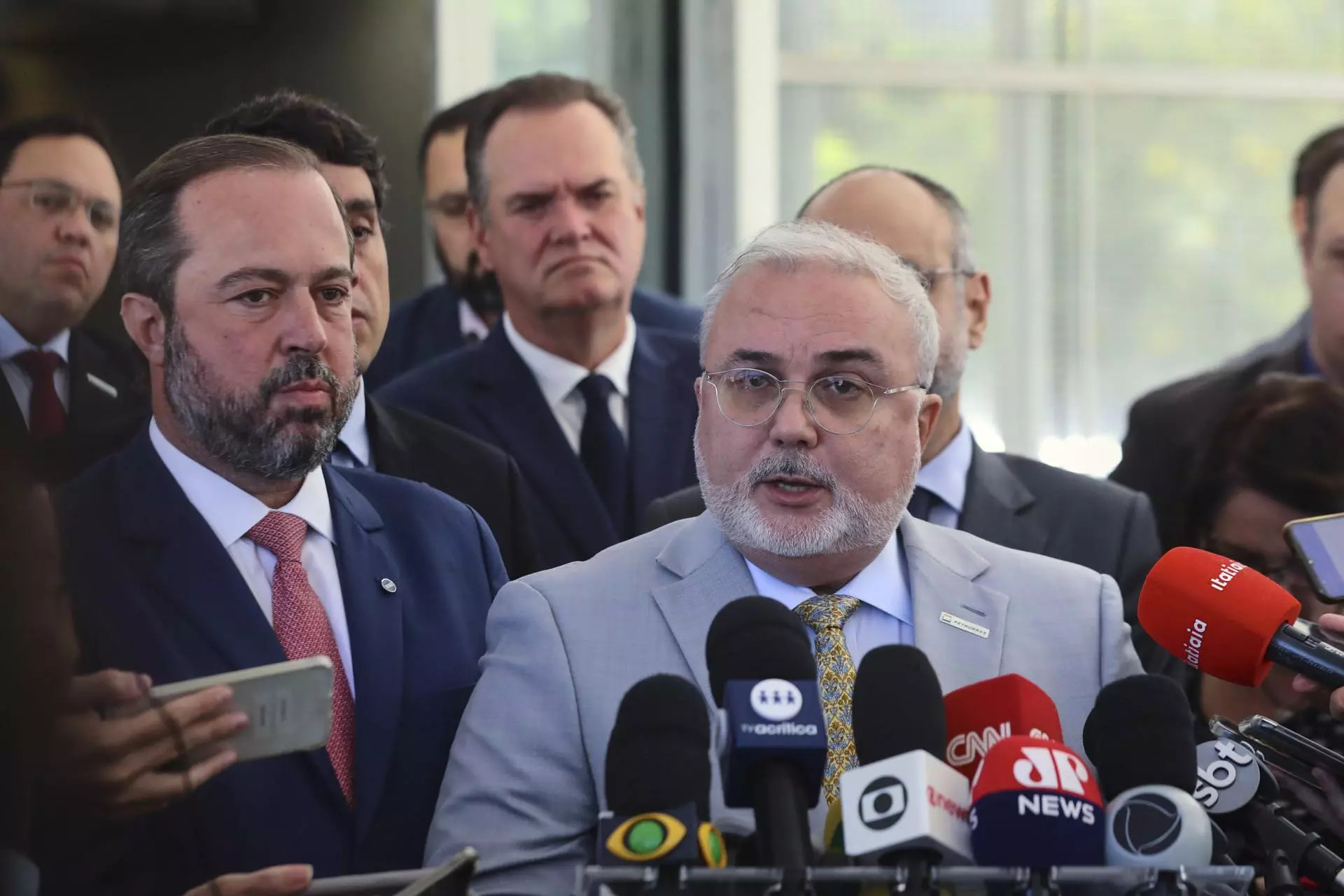
Mines and Energy Minister Alexandre Silveira (Social Democratic Party, or PSD), left, and Petrobras CEO Jean Paul Prates, center. Both have publicly positioned themselves in favor of oil exploration in the Amazon, evincing points of tension within the Lula administration. Photo: Agência Petrobras.
Inside the environment ministry, the assessment is that President Luiz Inácio Lula da Silva was throwing his support behind Minister Marina Silva when he refrained from interfering with the environmental licensing procedure for the FZA-M-59 block. The technical report that grounded Agostinho’s decision, signed by ten staff members in Ibama’s Sector for the Licensing of Offshore Oil and Gas Exploration, says that the proposal was rife with technical and legal uncertainties because a more in-depth evaluation, like a Sedimentary Environmental Area Assessment (Avaliação Ambiental de Área Sedimentar, or AAAS), had not been conducted to ascertain whether oil industry activities would be compatible with the region’s overall social and environmental context. The AAAS is a tool established in 2012 by the ministries of the environment and of mines and energy.
Suely Araújo, a senior analyst with the Climate Observatory and former Ibama president, told SUMAÚMA that Lula acted correctly when he abstained from commenting on the case. “This is a technical decision, and Ibama is the agency responsible for it. Not even Marina can interfere. The decision on whether or not to grant a license cannot come in response to political pressure,” Suely said. She feels the document signed by Agostinho is “very good and consistent.” She also said Agostinho “made history” and that he had prompted an important discussion by advocating that an AAAS be completed prior to any decision to award licenses for more offshore wells in the equatorial margin. In the Foz do Amazonas basin alone, licensing procedures are underway for another eight blocks, including the five applications filed by Petrobras.
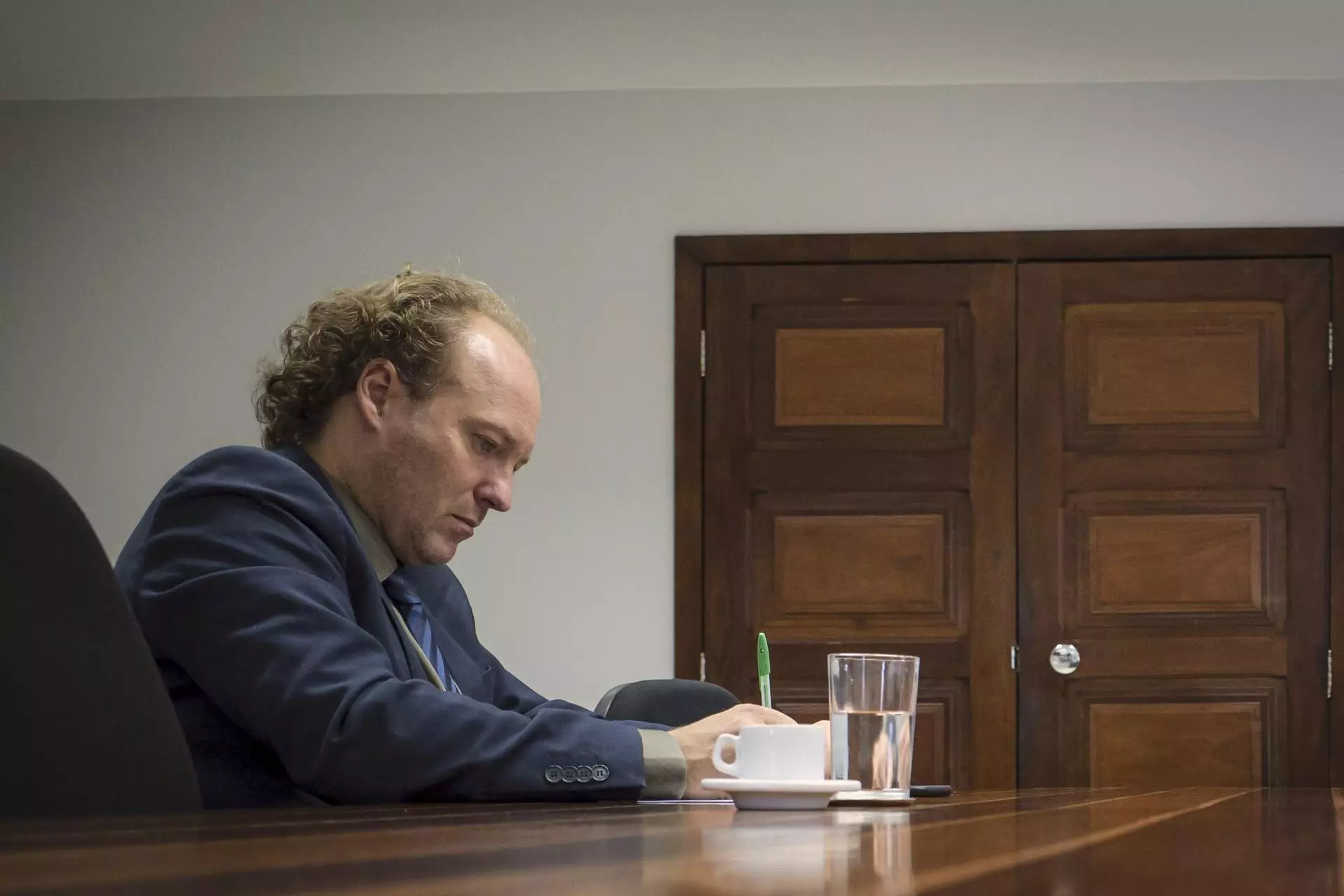
Rodrigo Agostinho, president of Brazil’s environmental agency Ibama, denied Petrobras a license to explore for oil at the mouth of the Amazon. Agostinho based his decision on a technical report signed by ten staff members in Ibama’s Sector for the Licensing of Offshore Oil and Gas Exploration. Photo: Ibama
Both the Petrobras CEO, Jean Paul Prates (a supporter of the Workers’ Party, led by Lula) and Mines and Energy Minister Alexandre Silveira, of the Social Democratic Party (PSD), have emphatically endorsed oil exploration in the region. National Integration Minister Waldez Góes, of the Democratic Labor Party (PDT), joined their ranks. Góes, an Amapá native and former governor of the state, is another voice within the government in favor of drilling in the Brazilian equatorial margin. The current governor of Amapá, Clécio Luís, of the Solidarity party, says he is considering asking the courts to override the decision by the Ibama president, but sources in the environmental sector say such a move has no chance of success because the “applicant” has the right to file for a license but not to obtain one; that is a technical decision.
For the same reason, the criticism raised by Clécio Luís and Randolfe Rodrigues—that the Amapá government and members of the state legislature were not duly heard—makes no sense. During the environmental licensing procedure, the “applicant” is only required to hold public hearings to inform the population in the area affected by the project and give them an opportunity to ask questions, which occurred in this case.
In early May, the mines and energy minister said he had called Agostinho, former deputy for the Brazilian Socialist Party (PSB), and the latter had allegedly promised to “sit down with technical staff to see if they could find a solution for the licensing.” Marina’s advisors, however, affirm that neither Alexandre Silveira nor Jean Paul Prates exerted any direct pressure on the minister. The duel, according to the advisors, took place mainly “through the press.” The Petrobras CEO was in Marina’s office in Brasilia in late March, but the meeting has been described as cordial: he defended the company’s “environmental commitment,” while she told him that the decision on the FZA-M-59 block would be a technical one, falling to Ibama.
Marina’s advisors lent much importance to what Lula said about Petrobras during the ceremony commemorating his government’s first one hundred days, on April 10. There he repeated—in almost the same words—what the minister told SUMAÚMA during an interview in March. “Petrobras will fund research on new renewable fuels. […] It’s important for you ministers to know what I think: I’ve never thought of Petrobras as an oil company; Petrobras has always been more than that. It’s an energy company. Historically, it has been the company that has invested most in research in this country and invested most in innovation in this country,” the president said at the time.
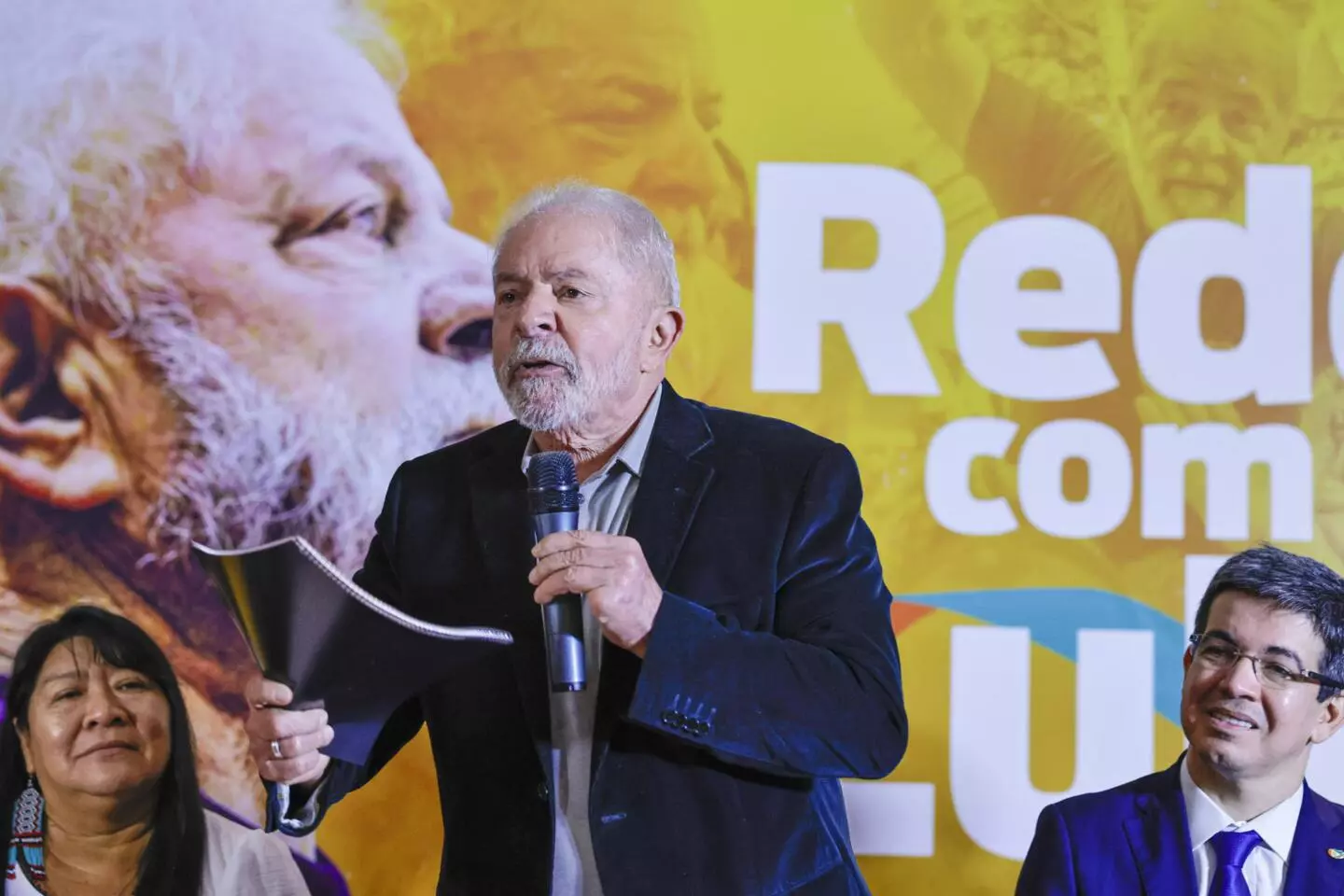
Lula, pictured here on the campaign trail in 2022, enjoyed the support of leaders of the Sustainability Network party, such as Randolfe Rodrigues and Joenia Wapichana. Senator Randolfe was selected as the government’s leader in Congress. Photo: Ricardo Stuckert
For the team at the environment ministry, this was an expression of Lula’s pledge to combat planetary heating, preserve the Amazon rainforest, and transition to green energy, something he has highlighted on his many trips abroad since taking office in January. On Wednesday, when Ibama announced Agostinho’s decision, Lula was not in Brazil. He was in Japan as a guest at a summit of the G7, a group comprising the seven wealthiest industrialized nations aligned with the United States. He returns only on Monday, May 22.
Despite the fact that Ibama technical staff had raised countless questions about the proposal’s environmental feasibility over the course of the licensing procedure, Petrobras said in its statement that it had “received the rejection of the license with surprise.” The oil company asserted that it met all agency requirements and regretted that no simulation of an accident response—called a Pre-Operational Assessment in technical terms—had been conducted to evaluate the response plans it had submitted. “With this decision, the country is relinquishing the right to confirm its potential to contribute to the economic and social development of the country’s North and Northeast regions,” the statement reads. The company added that it is now “committed” to obtaining a drilling license in the Potiguar Basin, the southernmost along the equatorial margin—and the only one where other companies are exploring for oil. “To meet Brazil’s future oil demand, the country will have to look for new sources, in addition to the pre-salt oil and gas areas,” he added. The document mentions a distance of 175 kilometers, or 109 miles, off the coast from Amapá, referring to the location of the Morpho well, where drilling would take place.
The statement in which Agostinho denies the license makes mention of other offshore ventures by Petrobras. He said the contingency plan proposed for the FZA-M-59 block “is inferior to practices adopted by the company itself in other offshore regions—which would be incongruous on a new front with highly vulnerable environmental assets.”
Political crisis inside a government faced with challenges
The prospect of oil exploration in the Brazilian equatorial margin has triggered yet another political crisis within the government that may have consequences for Lula’s governability. Marina Silva’s firm stance against the advancement of reliance on fossil fuels as part of the effort to halt the climate collapse has drawn clear opposition from three ministries: mines and energy, national integration, and agriculture. Of the three, it is public knowledge that there have been clashes with both the so-called ruralist caucus and also with agricultural sector interests linked to the ministry.
Although the decision by the agency’s head was based on technical criteria and, as he emphasized, without political interference from the environment ministry, Rodrigo Agostinho is seen as an ally of Marina within the government. Additionally, some senators are forming a front, with ties to the ministries of mines and energy and of national integration, to oppose the agency’s decision. The group wants to hold an emergency meeting with Lula, as soon as he returns from Japan, and Vice President Geraldo Alckmin (PSB).
On May 16, one day prior to Ibama’s decision, an informal delegation comprising Amapá Governor Clécio Luís, Senator Davi Alcolumbre (Brazil Union, AP), state deputies, business leaders, and representatives of the state’s business association had an audience with Mines and Energy Minister Alexandre Silveira in Brasilia. The pilgrimage, according to the minister’s official agenda, was to discuss “deepwater exploration by Petrobras in the Foz do Amazonas.”
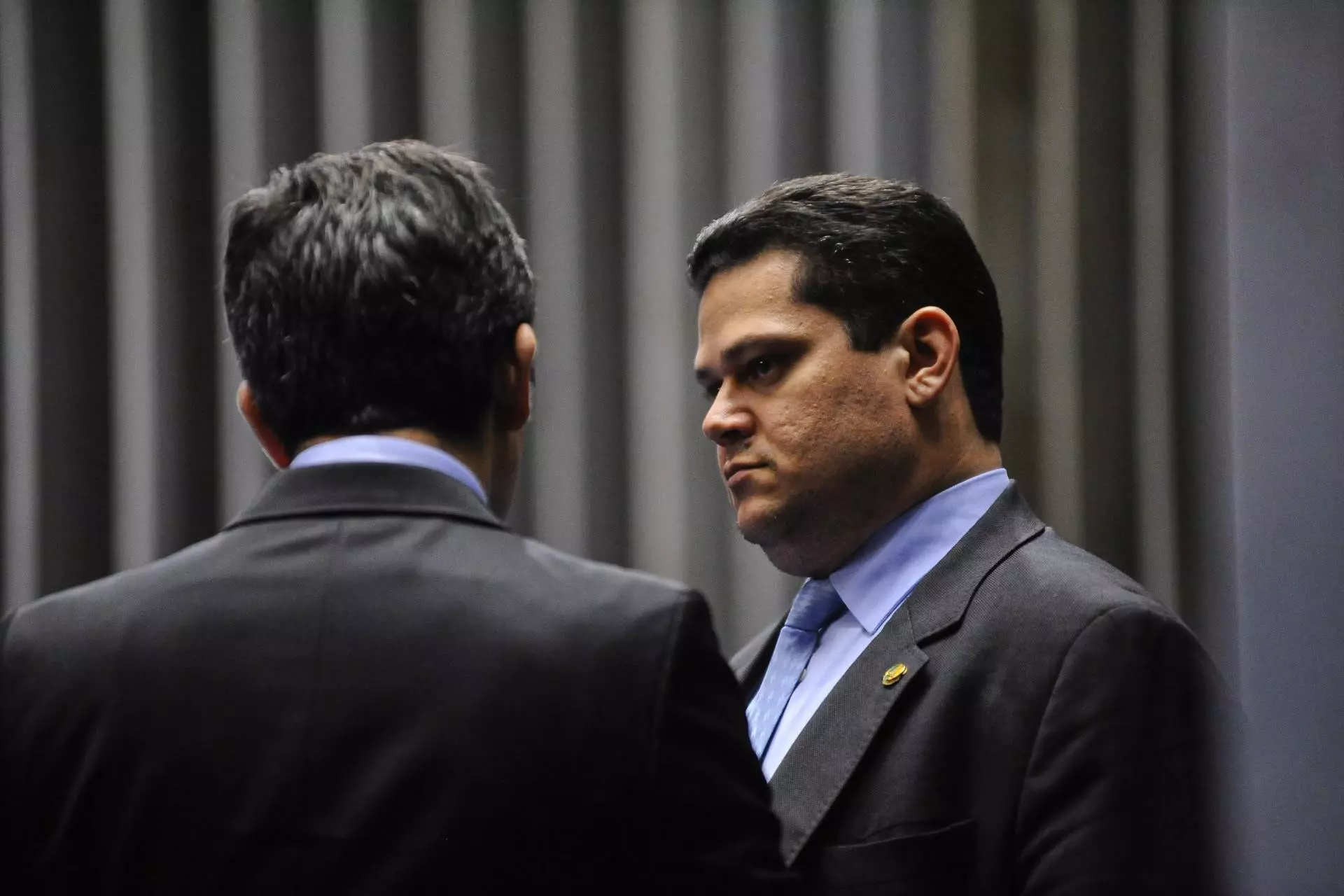
The former president of the Senate, Davi Alcolumbre (Brazil Union, AP), and the government’s leader in Congress, Randolfe Rodrigues (no party, AP), compete for political space but agree when it comes to defending oil exploration at the mouth of the Amazon. Both men have promised that the Amapá legislature will present a collective, coordinated response. Photo: Pedro França/Agência Senado
After publicly defending oil exploration at the mouth of the Amazon, Minister Alexandre Silveira strategically opted for a milder, more neutral tone. In an official statement, the ministry said it had “received Ibama’s decision regarding the equatorial margin quite naturally and with due institutional respect.” “The entire process of discussion surrounding the topic has guaranteed the full participation of the institutional bodies involved in the matter and will respect the guidelines of President Lula’s administration, of union and reconstruction, trust and dialogue, taking into account respect for the environment and for social and economic issues of concern to the country,” reads an excerpt from the statement released by the ministry.
Lula, providentially, is in Japan while this friendly fire is exchanged between ministries. From the beginning of his administration, it has been clear that oil exploration at the mouth of the Amazon would be the first big clash for his government, between a left of labor-union origin that worships oil as if the twentieth century had never ended and a left concerned with tackling the climate crisis and attuned to cutting-edge science that has proven that fossil fuels are villains capable of dooming the lives of coming generations.
The president knows that protecting the Amazon and opening an exploratory frontier at the mouth of the Amazon are incompatible. The question is how much an administration with governability issues can stand. For the moment, at least publicly, the right is watching as the friendly fire opened by Randolfe Rodrigues does its damage, opening the way for heavier artillery. But the right is, of course, already busy behind the scenes. Marina Silva’s ability to sustain this decision will depend on the backing of organized society inside and outside Brazil—and especially on international pressure.
Translation into Spanish: Julieta Boedo
English translation: Diane Whitty
Photography editing: Marcelo Aguilar, Mariana Greif and Pablo Albarenga
Page setup: Viviane Zandonadi





